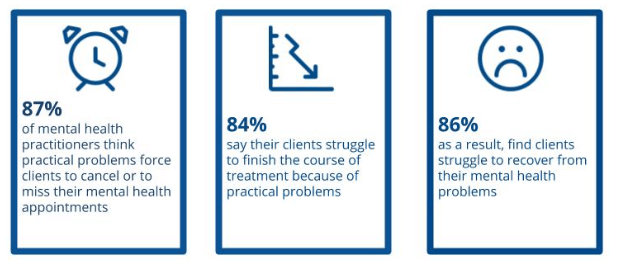
Amani Fairak, Policy Researcher, Citizens Advice
Practical recovery – a counsellor’s perspective
24 July 2018
I am a health policy researcher at Citizens Advice. Part of my role is to listen to people’s stories, both clients and practitioners. Recently, we have published a report that shows that mental health practitioners are seeing an increasing number of people who need help with practical problems. Dealing with financial difficulties, housing, employment or legal assistance all need specialist practical support.
In this blog, I am sharing a story we heard during an interview with a high-intensity mental health therapist, who works with clients who may need more intensive treatment. Pauline tells the story of one of her clients, about their ongoing struggle with practical problems. This is a story that Pauline has been seeing and hearing more often from her clients, and has a detrimental effect on people’s mental health, their treatment, practitioners and mental health services.
A counsellor’s story
“I often see people in crisis situations and the need for the right help feels more urgent. I don’t actually know what’s out there. I just know of a few. I know there are organisations out there but I generally don’t know who they are, or necessarily what they do. I need more up to date information.
“I’ve been seeing a lady who has been in a very bad place. She has had serious physical health problems for a long time, and has severe depression. She was accused of benefit fraud… and [was] interviewed … under caution on her own, and said that she would probably be prosecuted and go to prison. She tried telling them that the fraud was a misunderstanding and there was not deliberate fraudulent claims on her part.
“This current problem overshadows everything else in the client’s situation. Addressing this issue would enable us to look at other issues that I think could really be helped by [therapy]. The client has complex needs, and could really benefit from focused therapy. She has been too distraught for therapy to be of any use and at one point felt suicidal.
“This is time sensitive, and quite urgent. I’ve been trying to help my client get some legal advice. I have signposted her to a local organisation three times, but she did not get a call back. So instead I’ve tried searching myself. I ended up contacting our local law centre on behalf of the client.”
Practical problems
Presenting with a practical problem often leads mental health practitioners to step in to help beyond their clinical role. Spending two or three sessions trying to resolve practical problems, can put added pressure on mental health practitioners, and strain resources that could have been better used to help people with their mental health.
Our research shows that more than half of mental health practitioners (53%) find it stressful to deal with people’s practical problems, and many of them work late trying to find information to help their clients.
Practitioners also recognise that practical problems affect clients’ treatment and mental health services.

Recommendations
Mental health services are, fairly obviously, designed to help people with their mental health. But it is not their role to deal with practical problems that are complex or wide-ranging. NHS England, Clinical Commissioning Group commissioners and the Department for Health and Social Care all need to make the provision of integrated practical support in mental health services a priority.
